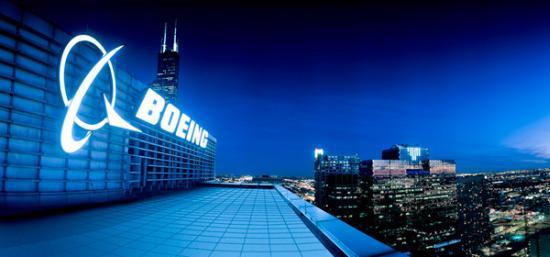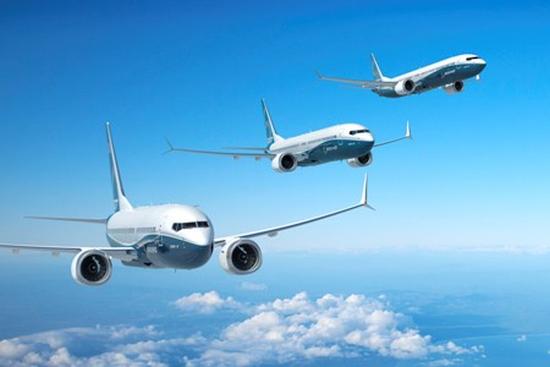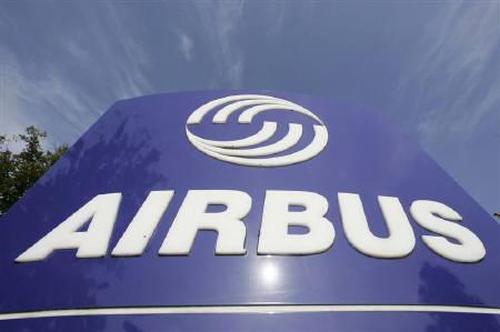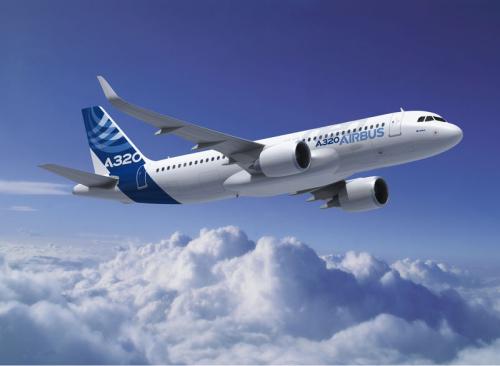Photographs: Kind courtesy, Boeing Aneesh Phadnis in Mumbai
The battle for the skies is moving to a new orbit - fuel efficient narrow body planes.
While Airbus has cashed in on the first mover advantage in this space with its A320neo (full form for New Engine Option) bagging orders for 1,579 planes across the globe, Boeing, which launched its plane in August last year, is catching up fast with nearly 1,000 orders for the 737 Max.
In India, however, the European plane maker is far ahead in the race with a host of airlines warming up to its sales pitch of Neos saving roughly 15 per cent on fuel costs.
That's substantial considering that fuel cost accounts for more than 50 per cent of the expenditure of an airline like GoAir, says the airline's CEO Giorgio De Roni. GoAir has placed order for 72 A320neos, while IndiGo has gone in for 150 of them.
In comparison, Boeing Max is yet to book any order for its fuel-efficient Max from any airline in India. But that may be only a lull before the storm.
Kapil Kaul of Centre for Asia Pacific Aviation says the potential size for the narrow body market in India in the medium term is 500 planes (including 250 ordered by GoAir and IndiGo).
"Airbus had almost a nine-month head start with its Neo. But we expect Boeing to announce orders for the 737 Max in the next few months," he says.
Both Jet Airways and SpiceJet are evaluating the Neo as well as the Max, and Kaul expects the airlines to order 130-150 planes and choose between Airbus and Boeing.
"It is critical for Jet Airways and SpiceJet to make commitment for new aircraft. Air India has significantly under- invested in their narrow body fleet and needs to address this for it to stay relevant," Kaul says.
...
Sky war: Airbus Neo versus Boeing Max
Image: Boeing 737 MaxPhotographs: Kind courtesy, Boeing
Other airlines in emerging countries have also welcomed Neo with open arms. Last Friday, Malaysian low-cost carrier Air Asia announced a $9.4 billion order for 100 airbus A320 including 64 A320neos, making it the largest customer for Airbus.
The order is a big boost for Airbus as it can end the year with a happier note despite losing the race for over all orders to Boeing in 2012. The A320neo's first flight is on track for the fourth quarter of 2014.
But Boeing isn't too perturbed by the Neo's early flight. "We have outsold Airbus this year. Airbus launched its A-340 plane before the Boeing 777, but now they have stopped producing the A340 while Boeing 777 is still selling," explains Boeing's senior vice president (sales) Dinesh Keskar.
"Max has better fuel efficiency than the Neo with more seats in an all economy configuration," he adds.
The battle has spilled over to ad campaigns as well. Last month, Airbus started a campaign after Boeing ran ads with specific claims about the superiority of Max over the Neo.
While Airbus said it placed ads only after Boeing failed to respond, Boeing said it was confident in its performance claims.
...
Sky war: Airbus Neo versus Boeing Max
Image: The Airbus company logo is pictured at the main entrance of the Airbus facility in the northern German city of StadePhotographs: Morris Mac Matzen/Reuters
Both Airbus and Boeing are pitching their planes for fuel efficiency besides bringing advantages like reduced emissions and increase the payload and range.
"Airlines will benefit from a 7 per cent advantage in operating costs over future competing airplanes (A320neo) as a result of optimised engines, more efficient structural design and lower maintenance requirements," Boeing said while launching the 737 Max.
Similarly, Airbus is promising its customers fuel savings of up to 15 percent with the Neo. Airbus estimates a market potential of 4,000 A320neo family aircraft over the next 15 years.
While the brand war is on, the fact is neither Neo nor Max will be an all-new aircraft built from scratch; instead it will be an upgraded version of the planes, with a choice of new, advanced engines which will offer big savings in fuel consumption. Both are promoting the new brands as examples of frugal innovation.
Last week, Airbus secured certification from the European Aviation Safety Agency for sharklets - the first phase of a gradual evolution to Neo.
Air Asia will be the first airline to receive Airbus A320 planes with sharklets by the year-end, while GoAir and IndiGo will receive sharklet-fitted planes in 2013.
...
Sky war: Airbus Neo versus Boeing Max
Image: A320neoPhotographs: Kind courtesy, Airbus
"The certification of Airbus' sharklets is a milestone that paves the way for airlines to benefit from savings in fuel," says Tom Williams, executive vice president at Airbus.
The annual greenhouse gas emission reduction per aircraft equipped with sharklets will be approximately 1,000 tonnes of CO2 - that's equivalent to taking 200 cars off the roads.
"Fuel consumption is related to many parameters, including the stage length (flight duration). Our average flight lasts slightly less than two hours and we expect 2 per cent fuel efficiency due to sharklets," GoAir's De Roni says.
Airbus ad targets Boeing
Last month, Airbus released advertisements accusing Boeing of "stretching the truth" to promote its planes. The advertisement shows a Boeing plane with an elongated nose like fictional character Pinnochio.
"They crossed a line when they started running specific numbers," Airbus sales chief John Leahy says in an interview with Bloomberg News. "They've blatantly misrepresented the facts," he says. Boeing denied the claim saying there was nothing wrong in its promotions.






article